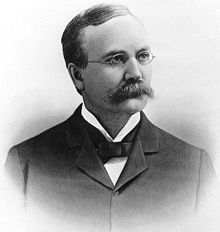Alva Adams (politician)
Alva Adams (born May 14, 1850 in Iowa County , Wisconsin , † November 1, 1922 in Battle Creek , Michigan ) was an American politician ( Democratic Party ) and between 1887 and 1905 three times governor of the state of Colorado .
Early years and political advancement
After elementary school, Adams became a successful businessman. In 1871 he came to Colorado, where he worked in the wood and hardware store. Within five years, he set up his company's branches along the Denver & Rio Grande railroad. In 1873 Adams was elected to the South Pueblo City Council and in 1876 was elected to the Colorado House of Representatives . Finally, he was elected governor of his state in 1886, with 50:47 percent of the vote against the Republican William H. Meyer .
Governor of colorado
Adams began his first of three non-contiguous terms on January 11, 1887. It was then that an employment agency was established in Colorado, public executions were abolished, and corporal punishment was banned in prisons. A new youth protection law banned child labor for young people under the age of 14. After the end of his first term on January 8, 1889, Adams devoted himself to his business interests again until he was elected governor for the second time on November 3, 1896. In his second term (January 12, 1897 to January 10, 1899) he brokered a strike in Leadville . A labor arbitration tribunal was also set up at that time. During this time the Spanish-American War fell , to which Colorado also had to contribute its part. The governor himself collected money to equip soldiers from his state.
Adams ran again for governor in 1904. The incumbent was James Hamilton Peabody , who was also controversial within his party . Adams won the election in November by nearly 10,000 votes ahead of Peabody. The Republicans around Peabody accused Adam of electoral fraud. In exchange for Peabody's appointment to the Colorado Supreme Court, the Republicans withdrew their protest and Adams was sworn in as governor on January 10, 1905. Two days later, Peabody protested the election. Lt. Gov. Jesse Fuller McDonald, elected by the Republicans in November 1904, set up a commission of inquiry. The Colorado Supreme Court agreed not to account for those constituencies in which electoral fraud had occurred, while indications of Republican electoral fraud were ignored. This was the only way to determine a lead for Peabody. Given the situation, the Democrats decided to prevent at least Peabody from becoming governor. It was agreed that Peabody would only be sworn in as governor if he was ready to resign immediately. With Peabody's swearing in on March 16, 1905, Adams was relieved of his office. Immediately after Peabody's resignation the following day, Jesse McDonald was sworn in as the new governor.
Another résumé
After retiring from the office of governor, Adams returned to his private business. In 1906 he ran again, albeit unsuccessfully, for the office of governor: he was clearly defeated by the Republican Henry Augustus Buchtel . In 1908 he was a member of the Democratic National Committee .
Alva Adams, after whom Adams County was named, died of diabetes on November 1, 1922. He had a son with his wife Ella Nye: Alva B. Adams represented the state of Colorado twice in the US Senate between 1923 and 1941 . His younger brother William was also governor of Colorado from 1927 to 1933.
literature
- Marjorie Hornbein, Three Governors in a Day. In: The Colorado Magazine 45, No. 3: 243-260 (1968).
Web links
- Alva Adams Collection at the Colorado State Archives.
- Alva Adams in the National Governors Association (English)
- Alva Adams in the database of Find a Grave (English)
| personal data | |
|---|---|
| SURNAME | Adams, Alva |
| BRIEF DESCRIPTION | American politician |
| DATE OF BIRTH | May 14, 1850 |
| PLACE OF BIRTH | Iowa County , Wisconsin |
| DATE OF DEATH | November 1, 1922 |
| Place of death | Battle Creek , Michigan |

